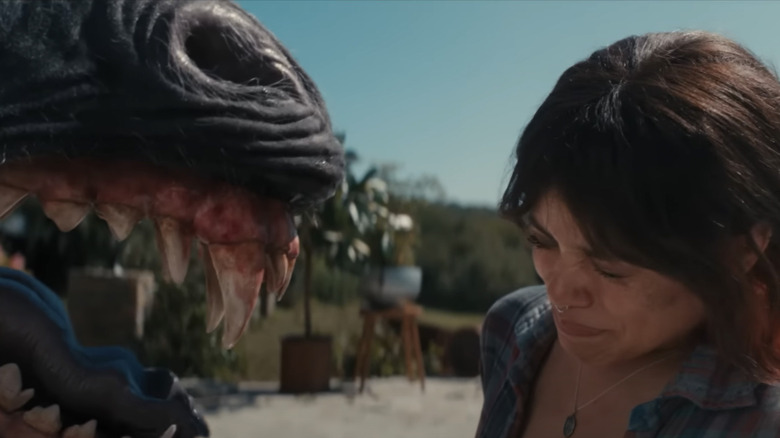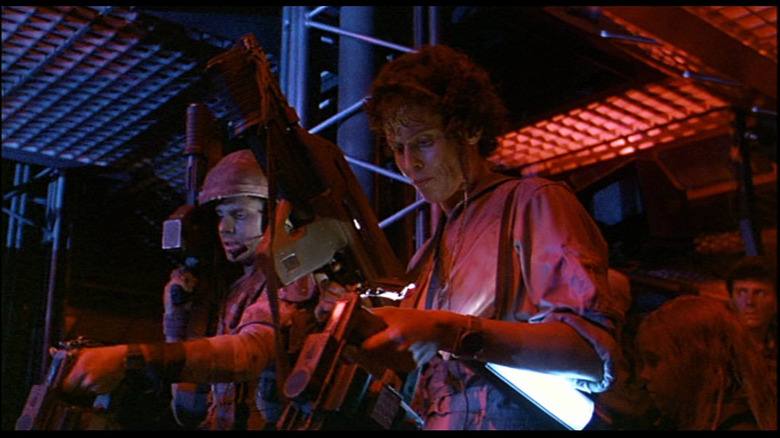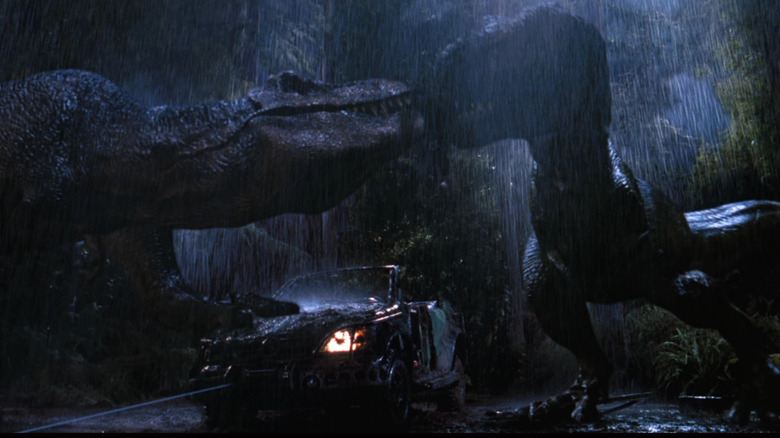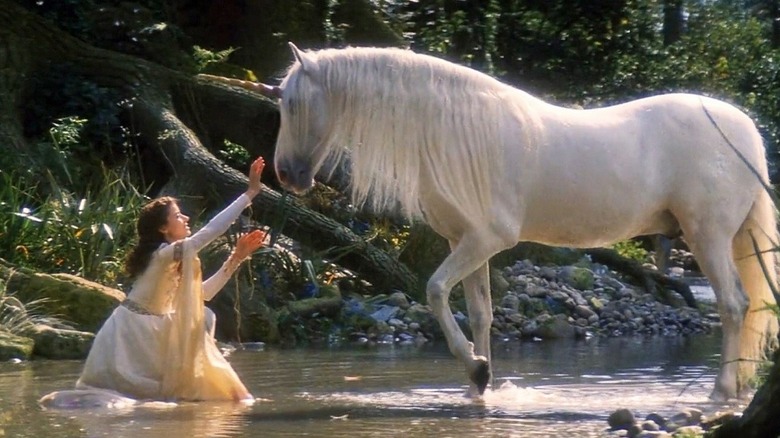Every Creature Easter Egg You Missed In Death Of A Unicorn
This article contains spoilers for "Death of a Unicorn."
When pop culture was invaded en masse by geeks, we began to see a huge uptick of references to other movies, TV shows, and the like. Heck, you could argue that some media was created almost as a delivery system for such references — "The Big Bang Theory," anyone? Of course, references within movies and TV shows to other movies and TV shows are certainly nothing new, but the rise of geek culture sure did make what used to be implicit, explicit. That approach to references hasn't gone away, if recent films like "Free Guy" are any indication. Yet it seems like the subtler, old-school version of making references and paying homage is still alive and well, too. Easter eggs can still be fun and unobtrusive rather than a filmmaker flaunting their trivial bonafides.
An example of the latter is this week's "Death of a Unicorn," the debut feature from writer/director Alex Scharfman. At a Q&A following the screening of the movie in Los Angeles I attended, Scharfman spoke about how excited he was to be able to make an original creature feature. With his comments, it became clear that Scharfman was unsurprisingly a fan of the genre, and as such, he admitted to threading several references to some other classic creature features throughout his film. Here, then, are the Easter eggs to other sci-fi and/or horror films that you may have missed in "Death of a Unicorn."
The motion tracker from 'Aliens'
In "Death of a Unicorn," estranged father and daughter Elliot (Paul Rudd) and Ridley (Jenna Ortega) accidentally hit an honest-to-goodness unicorn while en route to the mountain estate where the ailing pharmaceutical giant Odell Leopold (Richard E. Grant) is staying with his wife Belinda (Téa Leoni) and son Shepard (Will Poulter). When it's inadvertently discovered that the blood of the unicorn has magical healing properties, a newly cancer-free Odell insists on keeping the not-quite-dead creature in captivity for scientific study. Ridley, through studying tapestries that depict the relationship between unicorns and humans in the ancient past, discovers that unicorns may be deadly and highly protective of each other, a warning that Odell initially dismisses, given the immensely lucrative potential of the creature.
After Odell orders his science team, headed by Dr. Bhatia (Sunita Mani), to transport the creature outside the estate for further experiments, the scientists discover that their instruments begin detecting the presence of other, similar creatures in the area. Of course, these are the other unicorns come to take their revenge on these murderous, greedy humans, and the sound from the instruments that herald their approach are highly similar to the Colonial Marines' motion trackers from "Aliens." If you don't get the reference to James Cameron's film during the first scene it appears in, don't worry; a little later on, Odell, Elliot, and some other folks go hunting for a wounded unicorn only to get ambushed, "Aliens"-style. And hey, this may not be the only "Alien" franchise reference hidden in the film — doesn't the image at the top of this article remind you of the disastrous "Alien 3?"
A family of T. Rexes from 'The Lost World: Jurassic Park'
As it happens, these unicorns aren't merely looking out for the general survival of their endangered species. They have a highly personal interest in rescuing the unicorn that Elliot and Ridley hit because it turns out to be their child! That's right, the Leopolds are trying to carve up not just a real-life unicorn, but a baby unicorn, making their unscrupulousness that much more pronounced. It follows, then, that Mommy and Daddy Unicorn are highly protective, to the point of goring any and all of the humans who get in their way.
This dynamic between the unicorn family and the hapless humans caught in the middle is highly reminiscent of the conflict at the heart of Steven Spielberg's "The Lost World: Jurassic Park." In that film, a group of scientists looking to help preserve rather than exploit the dinosaurs find themselves in possession of a baby T-Rex who's been wounded by a human hunter. While trying to provide first aid to the child, the baby's cries draw the attention of its large adult parents. The good news is that their reaction proves that the Tyrannosaurus Rex is indeed a nurturing animal; the bad news is that this means they don't take kindly to other creatures messing with their kids. T. Rexes and unicorns have similar parenting styles; who knew?
The magical healing powers of 'E.T.' (and a little 'Legend' bonus)
One of the best aspects of "Death of a Unicorn" is its constant reminders that these unicorns aren't merely horses with horns. They are magical creatures, and as such, they have special properties as well as unusual weaknesses. Their biggest weakness is that they become completely docile and helpless when in the presence of an innocent young maiden, something which Ridley discovers to her chagrin. The concept of a unicorn being put in danger unwittingly by a young woman is apparently part of actual unicorn mythology, which is likely how it ended up as a plot point in 1985's "Legend." Though "Death of a Unicorn" may not be referencing Ridley Scott's fantasy fable directly, the two films share the basic plot of a unicorn in trouble thanks to the hypnotic allure of a girl's innocence. And let's not forget that Ridley made "Alien," and that Ortega's character is named Ridley!
Anyway, these unicorns fortunately have a magical power to help counteract this weakness, and that is their ability to heal themselves and regenerate. This power doesn't stop there, however, for they can also use it to heal other beings, such as humans. That's right — while sure, you could steal their blood and body parts to cure cancer and other diseases, it's far better all around if you simply befriend the unicorns in order to let them heal you instead, something which Elliot and Ridley come to discover. This power seems especially similar to the one wielded by everyone's favorite extraterrestrial, "E.T." Though "E.T." is a little more indiscriminating with offering up his healing powers than the unicorns are, it's still a good bet to be his pal. And while we're playing the name game, don't forget that Paul Rudd's character shares the name of E.T.'s best buddy.
Hopefully, this article has reinvigorated you to revisit "Death of a Unicorn," now that you know everything to look for. After all, unicorns should be respected, but their secrets are there for the taking!
On today's episode of the /Film Daily podcast, we spoke with writer/director Alex Scharfman about bringing the film to life:
You can subscribe to /Film Daily on Apple Podcasts, Overcast, Spotify, or wherever you get your podcasts, and send your feedback, questions, comments, concerns, and mailbag topics to us at bpearson@slashfilm.com. Please leave your name and general geographic location in case we mention your e-mail on the air.



